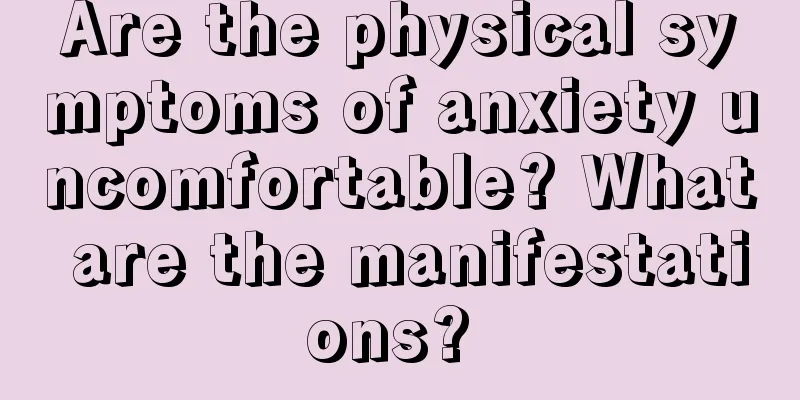Are the physical symptoms of anxiety uncomfortable? What are the manifestations?

|
Anxiety somatic disorder is the manifestation of anxiety symptoms caused by some physical diseases. That is to say, because of the cause of the disease, the patient has a very heavy psychological burden, and this psychological burden in turn reacts on the patient's body, causing some symptoms, often causing patients to have difficulty breathing, dizziness, rapid heartbeat, and some urinary system symptoms, leading to autonomic dysfunction, etc. 1. Respiratory symptoms: Patients feel difficulty breathing, mainly with the subjective feeling of insufficient inhalation, chest tightness, and difficulty breathing. They are very likely to experience sighing-like breathing and even feel suffocated. 2. Cardiovascular symptoms: Some patients may feel dizzy, have a rapid heartbeat, and high blood pressure; some patients may experience precordial pain, stabbing pain, dull pain, etc. These symptoms may last for several hours and are accompanied by local tenderness; some patients may experience panic and palpitations. 3. Digestive system symptoms: In addition to the loss of appetite mentioned above, people with anxiety disorders may also experience dry mouth, loss of taste in the mouth, nausea, vomiting, abdominal pain, diarrhea, bloating, indigestion and constipation. At the same time, they may feel discomfort in the upper abdomen but cannot clearly describe the specific feeling. 4. Urinary system symptoms: Some male patients will experience frequent urination, urgency, erectile dysfunction, and sexual loss; female patients will experience menstrual disorders and dysmenorrhea. 5. Autonomic nervous system symptoms: Physical anxiety is often accompanied by excessive sweating of the palms and soles, and in acute attacks, there is often profuse sweating and other symptoms of autonomic nervous system dysfunction. The reason for physical anxiety is closely related to the function of the autonomic nervous system. Anxiety itself is an emotional response and will be affected by the autonomic nervous system. Studies have found that when the autonomic nervous system functions abnormally, such as hyperactivity, the organs controlled by it will experience somatic reactions. 6. Muscle movement system symptoms: The more common type of headache is contraction or compression headache caused by muscle tension in the head, neck, face, limbs, etc., which is more obvious in the forehead or occipital area. In addition, the neck, shoulders, waist, and back may feel stiff and painful, and in severe cases, tremors and convulsions may occur. It is necessary to relieve patients' mental concerns, help them analyze the factors that may cause the disease, gradually eliminate unnecessary fears and concerns, and build and restore confidence in overcoming the disease. If necessary, anti-anxiety and anti-depressant drugs can be used for treatment. Find out the cause of the patient's disease, determine the location and extent of the lesion, and provide targeted treatment. |
<<: How to relieve severe neck pain
>>: What are the causes of dizziness in the morning
Recommend
What are the dangers of nasopharyngeal cancer
In life, the health hazards brought by nasopharyn...
It hurts because the wisdom teeth haven't grown out
The wisdom tooth has not yet grown out, but the p...
Can lobsters and eels be raised together
Many people buy some seafood in the seafood marke...
It hurts a bit to pick my ears
Most people like to clean their ears when they ha...
How to effectively care for melanoma patients
When many people are diagnosed with melanoma, the...
Can Niu Dali be soaked in water and drunk
The name Niudali contains the word "Niu"...
Can brain cancer be cured?
Brain tumors are divided into benign tumors, mali...
How to protect the intestines
Everyone knows that intestinal health is also ver...
What happens if you touch cold water after an abortion
Abortion is like a minor surgery. During this per...
The role and efficacy of Jibao
I don't know if you have ever eaten Jibao in ...
What are the diagnostic items for bile duct cancer
What are the diagnostic items for bile duct cance...
Is the recurrence rate of skin cancer high?
Skin cancer has a wide range of symptoms, such as...
Will I get liver cancer if I have HBeAg? Is liver cancer contagious?
A large proportion of liver cancer patients have ...
What are some plants that cure mosquito bites?
As spring comes, the temperature rises and many m...
How to calculate sugar content
Most of the food that humans eat in life contains...









